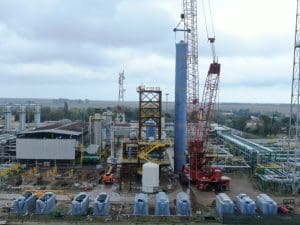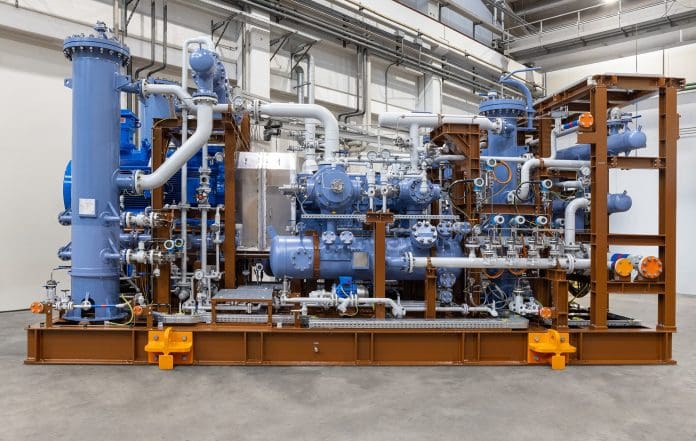SIAD Macchine Impianti will provide a carbon dioxide (CO2) compressor for a carbon capture and storage (CCS) project in Italy. The compressor is equipped with four horizontal cylinders and an explosion-proof 415-kW electric motor. Its function will be to compress CO2 from 6.5 psi (0.45 barg) up to 993 psi (68.5 barg), through four compression stages. To limit the increase in gas temperature, which is proportional to the increase in pressure in the various stages, the compressor was equipped with heat exchangers. In addition, special separators were designed to remove the condensate produced during the cooling phase. This was essential for eliminating condensed gases inside the compression chamber which, if not removed, would cause corrosion and mechanical damage, compromising the operation of the machine.
The Project
In December 2022, Eni Chief Executive Officer (CEO) Claudio Descalzi and Snam CEO Stefano Venier signed an agreement to jointly develop and manage Phase 1 of the Ravenna CCS Project, through an equal joint venture. Phase 1 covers the capture of 25,000 tons (22,679 tonnes) of CO2 emitted from Eni’s natural gas treatment plant in Casalborsetti (Ravenna), Italy. This plant currently receives and processes natural gas from offshore fields and will be converted for its new purpose. Once captured, the CO2 will be pressurized and piped to the Porto Corsini Mare Ovest platform and injected into the homonymous depleted gas field in Ravenna’s offshore, 8202 ft. (2500 m) below the seabed.

Phase 2, which is scheduled to start by 2026, will achieve a storage capacity of 4.4 million tons (4 million tonnes) per year by 2030.
“It is a fact that CCS technologies have consolidated their role at a global level as a tool available to achieve decarbonization goals, and for this reason they are gaining more and more attention from governments, investors, and industry players. CCS projects are being developed globally and are already at an advanced stage both in Europe — especially in the UK, the Netherlands, and the Nordic countries — and in the United States,” said Venier. “This joint venture sets the first initiative in Italy with the ambition to offer a solution to the entire hard-to-abate production cluster in the Po Valley, and potentially also to other Italian regions as well as other countries bordering the Mediterranean basin.”
“Today, it is necessary to join forces in order to reconcile decarbonization goals, energy security, and competitiveness,” said Descalzi. “Phase 1 of the Ravenna project will allow us to reduce emissions from the Casalborsetti power plant, launching in Italy a project based on a mature technological process that is key for the achievement of our climate goals. CCS is complementary to renewables, to energy efficiency solutions, and to the other available levers, and is central to avoiding CO2 emissions from highly energy-intensive sectors that currently have no technological alternatives for decarbonization.”



















